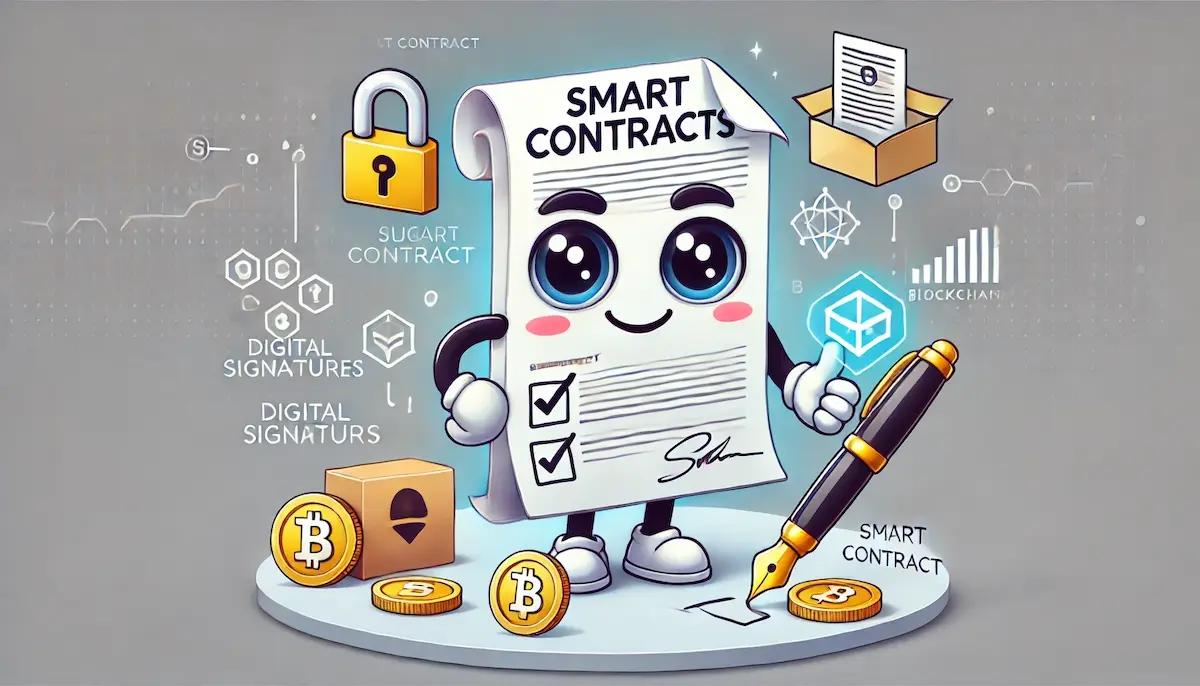A smart contract is a self-executing contract with the terms of the agreement directly written into lines of code. These contracts automatically enforce and execute the agreed-upon terms when predefined conditions are met. Smart contracts operate on blockchain technology, ensuring transparency, security, and immutability, which eliminates the need for intermediaries.
How Smart Contracts Work
Smart contracts function through blockchain platforms like Ethereum, Binance Smart Chain, and Cardano. Here’s a simplified breakdown of how they work:
- Agreement: Two or more parties agree on the terms and conditions of the contract.
- Coding: The agreed terms are coded into a smart contract using programming languages like Solidity (for Ethereum).
- Deployment: The smart contract is deployed on a blockchain, becoming part of the distributed ledger.
- Execution: When predefined conditions are met, the smart contract executes the terms automatically.
- Verification: The blockchain network verifies the transaction, ensuring all parties adhere to the contract.
- Immutability: Once executed, the contract and its outcomes are recorded on the blockchain, preventing alterations.
Features of Smart Contracts
Automation
Smart contracts automate processes by executing actions when conditions are met. For example, a smart contract for a freelance project could automatically release payment once the work is submitted and approved.
Transparency
All parties involved in a smart contract can view its terms and conditions. This transparency builds trust, as everyone knows what to expect and can verify the contract’s execution.
Security
Smart contracts are secured by blockchain technology. The decentralized nature of blockchains makes it difficult for malicious actors to alter contract terms or outcomes, ensuring data integrity.
Efficiency
Smart contracts eliminate the need for intermediaries, such as lawyers or brokers, speeding up the contract execution process and reducing associated costs.
Immutability
Once deployed, smart contracts cannot be altered. This immutability ensures that terms cannot be tampered with after the fact, providing a reliable and enforceable agreement.
Applications of Smart Contracts
Financial Services
In the financial sector, smart contracts are used for various purposes, including insurance claims, loan agreements, and asset transfers. They ensure prompt and accurate execution of transactions, reducing the risk of fraud and errors.
Supply Chain Management
Smart contracts can enhance supply chain transparency and efficiency. They can automatically track and verify the movement of goods, trigger payments, and manage inventory, ensuring all stakeholders are informed and aligned.
Real Estate
In real estate, smart contracts streamline property transactions by automating processes such as title transfers, escrow services, and rental agreements. This reduces paperwork and speeds up transactions.
Healthcare
Smart contracts can securely manage patient data, streamline billing processes, and ensure compliance with medical protocols. They enable seamless data sharing between healthcare providers while maintaining patient privacy.
Intellectual Property
Artists and creators can use smart contracts to manage and monetize their intellectual property. For example, a smart contract can automatically enforce royalty payments whenever a digital artwork is sold or used.
Challenges of Smart Contracts
Legal Recognition
One of the main challenges is the lack of legal recognition and regulation. While smart contracts are legally binding in theory, their status in the legal system can vary by jurisdiction.
Coding Errors
Errors in the code can lead to unintended outcomes. Since smart contracts are immutable, fixing bugs or vulnerabilities after deployment can be challenging and costly.
Complexity
Creating and deploying smart contracts requires technical expertise. This complexity can be a barrier for businesses and individuals unfamiliar with blockchain technology.
Scalability
Blockchain networks can face scalability issues, affecting the speed and efficiency of executing smart contracts during high transaction volumes.
The Future of Smart Contracts
The future of smart contracts is promising, with advancements in blockchain technology poised to address current challenges. Improvements in scalability, legal frameworks, and user-friendly tools will drive broader adoption across various industries. As blockchain technology matures, smart contracts are expected to become a standard method for creating secure, efficient, and transparent agreements.
Blockfine thanks you for reading and hopes you found this article helpful.
